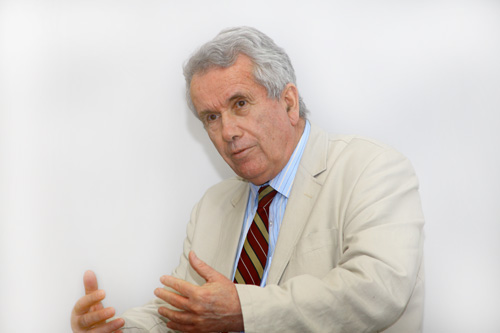“All the generals I know understand that there’s no military solution in Afghanistan,” said Martin Bell, a seasoned former BBC war correspondent, in an interview with The Linc.
Wearing his trademark “lucky” white suit, Bell spoke of the last time he was in Afghanistan in the Summer of 2007. He’d heard of a 48-hour battle between the Royal Anglicans and the Taliban, where neither side sustained casualties. However, 27 civilians had been slaughtered in the process — including 17 children.
“You have to win over the allegience of the Afghan people. You can’t do that if you are bombing them indiscriminately,” said Bell.
These situations aren’t being reflected by the media beacause all journalists are embedded within British or American military units, he claims. “The problem with it is this: you see the heroic actions of the British soldiers, a lot of the television coverage has been fantastic, but it’s like a recruiting movie.When the shooting starts, and the NATO bombs and rockets go in, there is no accounting for what’s happening to the Afghans, and it’s very misleading. We can be told by our leaders we’re doing incredibly well — and we’re not.”
He sees embedding as the only option, firstly as the sole way into Afghanistan for a reporter, and secondly for their own protection. He cites the examples of Stephen Farrel, the New York Times journalist who had to be rescued by the military after being captured by the Taliban.
“[Farrel] tried to do what was journalistically right, which was to report the affect of the NATO airstrike on civilians, but he hung around too long, he was kidnapped, and in the rescue operation his interpreter was killed and a British soldier was killed.”
This, says Bell, is a good example of why journalists should not un-embed themselves.
He highlights ITV’s Bill Neely, Channel 4’s Vaughan Smith, Sky’s Ross Kemp, and the Independent’s Robert Fisk as good reporters on the attack on Afghanistan.
The interview moves onto domestic politics, and when asked if he believes one man can really make a difference in our political system, Bell is refreshingly positive — in spite of the current mire of distrust and corruption rife in British politics.
“I cannot think of a time in my political life where an individual can make more of a difference than now.
“I do think it is possible for individuals to make a huge difference, especially now. What happened in Tatton in 1997 [Bell’s election to parliament as an independent] was a people’s insurrection against an MP they really disliked and distrusted, and I think we’re going to get more of the same in 2010.”
He also thinks the recent expenses scandal, on which Bell has just released the book called “A Very British Revolution”, has got people involved in politics: “People are saying it’s not [the politician’s] Parliament, this is our Parliament. People are outraged.”
However, he is worried that this could lead to increased apathy and a lower turnout at the next General Election, or worse still, an increase in votes for the BNP.
Lamenting the decline of the provincial press outlets, Bell reminisces on the newspapers in his constituency while he was an MP: “The Wilmslow Express and the Knutsford Guardian have both closed their front offices.
“They’re now cut and pasted from hubs. And at a time of political scandal, when the newspapers should be taking the politicans to task — they’re not. They’re cutting and pasting press releases. So I think we’ve lost a lot.”
He’s also got some advice for Lincolnshire residents in light of the MPs expenses scandal: “You should be asking yourselves why so many of the scandals have centred on this county? The moat was in this county, the bell tower is in this county — come on! What’s wrong with Lincolnshire? It calls for a people’s uprising, I would say.”
Having been elected to Parliament in 1997 on the back of an anti-sleaze campaign, serving only one term as he had originally promised prior to his election, speculation is rife over whether he will stand again. Last year he declared that he was undecided on whether he would run again, having lost out in 2001 to Eric Pickles in the Essex seat of Brentwood and Ongar.
The Linc asked Bell if he can confirm if he will be contesting a seat in the next General Election. “No, I’m not,” he says, “but I am helping some people”.


I am a full taxpaying citizen voter who has been studying the fraudulent claims of MPs since the Conway scandal! I will be voting in the next election, which I see as an opportunity to disinfect this Fraudsters’ Parliament.
When we, the taxpaying citizen voters, have wrested the reins of power from those in this Fraudsters’ Parliament, I then expect to see an end to “investigation by cronies” which this Parliament sees as its right, and I expect to see the FULL deployment of Sections 2-4 of The Fraud Act 2006.
This will be followed by prosecutions, sentencing and the slamming of cell doors behind thosse guilty of fraudulent use of taxpayers’ monies!